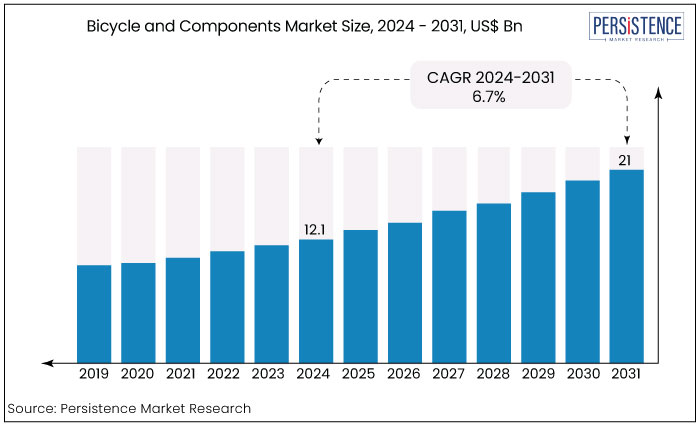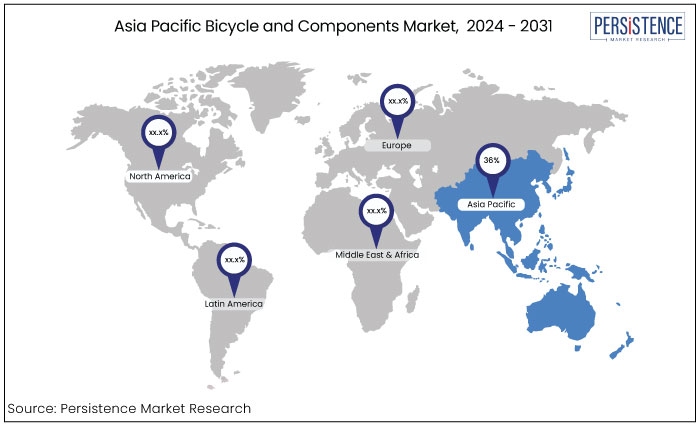Industry: Automotive & Transportation
Published Date: September-2024
Format: PPT*, PDF, EXCEL
Delivery Timelines: Contact Sales
Number of Pages: 166
Report ID: PMRREP12895
The bicycle and components market is estimated to reach a valuation of US$21 Bn from the value US$12.1 recorded in 2024. The market is estimated to secure a CAGR of 6.7% during the forecast period from 2024 to 2031.

Key Highlights of the Market
|
Market Attributes |
Key Insights |
|
Bicycle and Components Market Size (2024) |
US$12.1 bn |
|
Projected Market Value (2031) |
US$21 bn |
|
Global Market Growth Rate (CAGR 2024 to 2031) |
6.7% |
|
Historical market Growth Rate (CAGR 2019 to 2023) |
4.8% |
|
Region |
Market Share in 2024 |
|
Asia Pacific |
36% |
The increased urbanization in the region is fueling the need for sustainable transportation alternatives, which in turn is increasing the need for bicycle components. Asia Pacific dominates the market and contributes 36% of the total market share.
The high proportion can be ascribed to various factors including the region's substantial population, which results in a substantial client base for bicycles and accessories. There are prominent bicycle manufacturers like Giant Manufacturing Co. Ltd. and Merida Industry Co. Ltd in Asia Pacific. This has resulted in a robust supply chain for bicycle parts and accessories.
The region exhibits a robust cycling culture, particularly in countries such as China, Japan, and Taiwan. Consequently, there has been an increased requirement for components and accessories that specifically meet the preferences and requirements of avid cyclists including top-notch performance parts.
The increasing prevalence of e-commerce platforms and online marketplaces has facilitated customers' ability to conveniently acquire and buy bicycle components.

|
Category |
Market Share by 2024 |
|
Product - Components |
61% |
Based on product, the global bicycle and components market is classified into apparels and components. Among these, the components segment dominates the market. The component segment to exhibit high market share accounting for about 61% of the total revenue.
The component category is anticipated to experience a substantial increase during the forecast period due to the increasing use of bicycles in fitness and transportation. The pedal sub-segment of components experienced high market share and is projected to experience significant growth throughout the projected period.
The huge market share can be ascribed to the fact that pedals are one of the most commonly replaced components on a bicycle. This is due to the substantial wear and tear they experience over time particularly for dedicated cyclists who ride frequently.
|
Category |
Market Share by 2024 |
|
Bicycle Type - Road |
47% |
Based on bicycle type, the bicycle and components market is segmented into mountain, road, hybrid and cargo bicycles. Among these, the road type bicycle dominates the market. The road bicycle category to account 47% of the market share and is projected to maintain its dominance throughout the forecast period.
The surge in the popularity of standard bicycles can be attributed to their relative ease of customization in comparison to other categories of bicycles such as racing, mountain, or specialist ones.
The increasing inclination of consumers to customize road bikes for specific purposes is expected to drive market expansion in the future. The cargo bikes segment is expected to experience the notable growth rate during the projection period.
The constituents of a bicycle encompass handlebars, pedals, brakes, gears, wheels, tires, and frames. Every element of the bike has a distinct purpose in its functioning and can differ in structure and substance depending on the type of biking, such as road cycling, mountain biking, or commuting.
Rising gasoline costs are incentivizing a significant number of individuals to choose cycling as a mode of transportation. Manufacturers prioritize achieving specific criteria such as performance, durability, and weight specifications enabling cyclists to personalize and enhance their bikes for particular purposes.
The total riding experience and safety standards in the cycling business are significantly influenced by the quality and compatibility of bicycle components making them essential. The expansion of the bicycle component market is being driven by global trends such as climate change, which need the adoption of environment-friendly transportation alternatives. These features have created fresh prospects for the advancement of products.
The bicycle and components market experienced significant growth driven by several key factors from 2019 to 2023. The period saw a remarkable increase in demand for bicycles and related components due to evolving consumer preferences, environmental concerns, and technological advancements.
Before 2023, the market experienced steady growth driven by rising health consciousness, environmental awareness, and technological advancements. The increasing popularity of cycling as a fitness activity, urbanization, and investments in cycling infrastructure fueled demand.
Post-2024, the market is projected to continue its upward trajectory albeit with a focus on sustainability and technological integration. The increasing emphasis on reducing carbon emissions and promoting green transportation solutions is expected to drive the adoption of bicycles particularly e-bikes in urban areas.
Technological advancements such as intelligent biking accessories and improved battery technologies for e-bikes will further enhance the user experience and attract a broad consumer base. Additionally, governments worldwide are anticipated to invest more in cycling infrastructure and policies promoting safe and convenient cycling environments. As a result, the market is likely to see sustained growth, supported by ongoing innovations and favorable regulatory frameworks.
Rising Health and Fitness Awareness
The increasing awareness of health and fitness has been a key driver for the bicycle and components market. As individuals become more health-conscious, they incorporate cycling into their daily routines for physical exercise, weight management, and overall well-being. Cycling is recognized for its cardiovascular benefits such as muscle strengthening, and low-impact nature making it an attractive exercise option for people of all ages. This shift toward a healthy lifestyle has significantly boosted bicycle sales.
Urbanization and Traffic Congestion
Rapid urbanization has led to increased city traffic congestion making commuting a challenge. Bicycles offer a practical solution for navigating congested urban environments. They are efficient for short-distance travel and help reduce traffic congestion and the demand for parking spaces.
Many urban planners are incorporating cycling infrastructure such as dedicated bike lanes and bike-sharing programs to make cities more bicycle-friendly. These developments are encouraging people to adopt cycling as a primary mode of transportation.
Market Diversification and Customization
The bicycle market has increasingly diversified offering various products to meet consumer needs and preferences. Manufacturers produce specialized bicycles for various purposes including commuting, mountain biking, road racing, and leisure cycling. Customization options, such as adjustable components and personalized designs, attract consumers seeking tailored cycling experiences. This diversification and focus on customer preferences have expanded the market base.
Lack of Infrastructure and Safety Concerns
Another significant restraint for the growth of the bicycle and components market is the need for adequate cycling infrastructure and prevailing safety concerns among potential cyclists. In many urban areas, the infrastructure for cycling needs to be developed.
The absence of dedicated bike lanes and cycling paths makes it challenging for cyclists to navigate through city streets safely. This lack of infrastructure is a deterrent for potential cyclists particularly for commuting purposes.
The limited availability of secure bicycle parking and storage facilities is another infrastructure-related issue. Cyclists often struggle to find safe places to park their bikes, leading to concerns about theft and vandalism. This is especially problematic in densely populated urban areas.
Safety concerns are a key deterrent for many potential cyclists. The risk of motor vehicle accidents is a significant worry particularly in cities with high traffic volumes and inadequate cycling infrastructure.
The fear of being involved in traffic accidents discourages people from choosing cycling as a mode of transport. In many regions, there is a lack of awareness among both cyclists and motorists regarding road sharing and cycling safety. This can lead to dangerous situations on the road, further discouraging people from cycling.
Expansion of Electric Bikes (e-Bikes) Market
There is a significant opportunity for manufacturers to innovate and differentiate their products as e-bikes gain popularity. This includes improving battery life, enhancing motor efficiency, and integrating smart technologies like IoT connectivity, GPS tracking, and fitness monitoring systems.
E-bikes can cater to a wide range of consumers from urban commuters and recreational cyclists to older adults and those with physical limitations. Tailoring e-bike models to meet the specific needs of these diverse segments can drive market growth.
With increasing focus on reducing carbon emissions and promoting sustainable transportation, e-bikes represent a green alternative to traditional motor vehicles. Companies can leverage this trend by marketing e-bikes as eco-friendly transportation options.
Sustainable and Eco-Friendly Materials
Adopting sustainable manufacturing practices and using eco-friendly materials can enhance brand reputation and appeal to environmentally conscious consumers. This includes using recycled materials, reducing carbon footprints, and implementing energy-efficient production processes. Obtaining certifications for sustainability and adhering to environmental standards can differentiate products in the market and attract eco-conscious consumers.
The global bicycle and components market is characterized by intense competition among numerous players ranging from established multinational corporations to innovative start-ups. Key market participants continuously strive to gain a competitive edge through various strategies including product innovation, brand differentiation, and strategic partnerships.
The bicycle and components market is highly competitive with significant players leveraging innovation, brand strength, and strategic positioning to maintain and grow their market share. Also, emerging companies and niche brands continue challenging the status quo driving the market toward continuous evolution and growth.
Recent Developments in the Bicycle and Components Market
|
Attributes |
Details |
|
Forecast Period |
2024 to 2031 |
|
Historical Data Available for |
2019 to 2023 |
|
Market Analysis |
US$ Billion for Value |
|
Key Regions Covered |
|
|
Key Market Segments Covered |
|
|
Key Companies Profiled |
|
|
Report Coverage |
|
|
Customization & Pricing |
Available upon request |
By Product
By Bicycle Type
By Type
By Region
To know more about delivery timeline for this report Contact Sales

The market is projected to exhibit a CAGR of 6.7% during the forecast period.
Asia Pacific is the leading regional market.
A few of the leading players operating in the market are Dorel Industries Inc, Accell Group N.V., Shimano Inc., and SRAM LLC.
Components to account for the 61% share in the market by 2024.
The market is estimated to be valued at US$21 Bn by 2031.